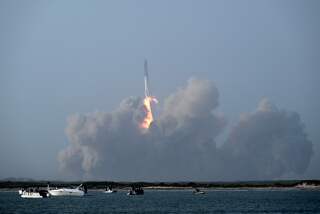SpaceX could launch demonstration satellites for its constellation Saturday
- Share via
SpaceX could launch the first two demonstration satellites of its proposed network of satellites as early as Saturday, according to documents filed with the Federal Communications Commission.
The two satellites, known as Microsat-2a and Microsat-2b, are set to launch as the so-called secondary payload on Saturday’s Falcon 9 launch from Vandenberg Air Force Base in California, according to a letter dated Feb. 1 to the FCC from a SpaceX executive. The letter was submitted to the agency Monday.
The primary mission for Saturday’s launch is the Paz Earth observation satellite, which was built by Airbus and will be operated by Spanish government satellite services operator Hisdesat.
The launch of the two demonstration satellites will test their design, structure and subsystems. The Hawthorne company also plans to test the satellites’ communication paths by using five test ground terminal stations and three mobile test vans, according to past FCC filings.
Test stations will be located in Hawthorne; Fremont; McGregor and Brownsville, Texas; and in Redmond, Wash., where SpaceX has established an office dedicated to satellite development.
SpaceX declined to comment.
The demonstration satellites, which will be in the shape of a box measuring 3 feet by 2.2 feet by 2.2 feet, will be part of the first phase of testing for SpaceX’s so-called constellation, which the company has said would initially consist of 4,425 satellites.
The constellation is intended to provide broadband internet service at “fiber-like speeds,” especially for individual households and small businesses, according to testimony from Patricia Cooper, SpaceX vice president of government affairs, during an October Senate committee hearing.
Assuming a successful demonstration of the satellite and ground technology, SpaceX plans to start launching operational satellites in phases starting next year and will reach full capacity by 2024, Cooper said in her testimony. Commercial service could start after 800 satellites have been launched.
SpaceX is just one of several companies, including OneWeb and Boeing Co., that plan to launch constellations of hundreds or even thousands of small satellites to provide internet access, particularly in rural areas.
On Wednesday, FCC Chairman Ajit Pai called for the agency to approve SpaceX’s application to provide broadband service through satellite technology.
“I have asked my colleagues to join me in supporting this application and moving to unleash the power of satellite constellations to provide high-speed internet to rural Americans,” he said in a statement. “Satellite technology can help reach Americans who live in rural or hard-to-serve places where fiber optic cables and cell towers do not reach. And it can offer more competition where terrestrial internet access is already available.”
Twitter: @smasunaga
UPDATES:
9 a.m.: This article was updated with a statement from Federal Communications Commission Chairman Ajit Pai.
This article was originally published at 5 a.m.
More to Read
Inside the business of entertainment
The Wide Shot brings you news, analysis and insights on everything from streaming wars to production — and what it all means for the future.
You may occasionally receive promotional content from the Los Angeles Times.











